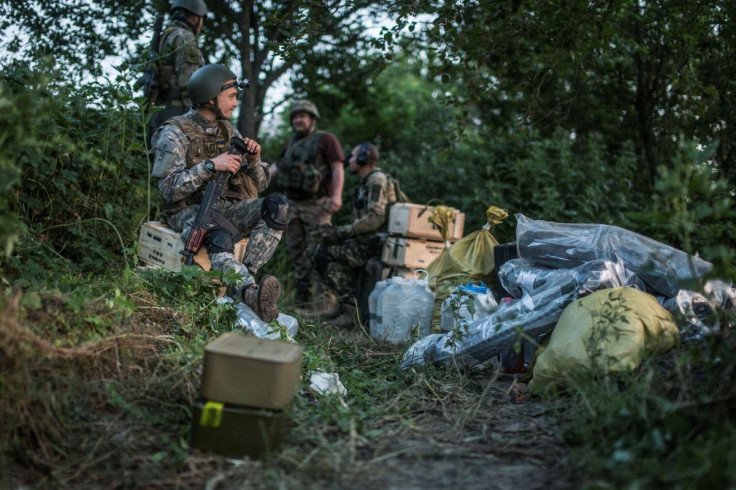Ukraine Confirms Fall Of Sievierodonetsk After Weeks-long Fight

Russian forces have fully occupied Sievierodonetsk, the mayor of the eastern Ukrainian city said on Saturday, confirming Ukraine's biggest battlefield setback for more than a month, after weeks of some of the bloodiest fighting of the war.
Pro-Russian separatists said Moscow's forces were now attacking the last major Ukrainian-held bastion in eastern Luhansk province, Sievierodonetsk's twin city Lysychansk on the opposite bank of the Siverskyi Donets river.
The fall of Sievierodonetsk - once home to more than 100,000 people, now a wasteland - was Russia's biggest victory since capturing the port of Mariupol last month. It transforms the battlefield in the east after weeks in which Moscow's huge advantage in firepower had yielded only slow gains.
Russia will now be hoping to press on and seize more ground on the opposite bank, while Ukraine will hope that the price Moscow paid to capture the ruins of the small city will leave Russia's forces vulnerable to a counterattack in coming weeks.
"The city is now under the full occupation of Russia. They are trying to establish their own order, as far as I know they have appointed some kind of commandant," Mayor Oleksandr Stryuk said on national television.
He said anyone left behind could no longer reach Ukrainin-held territory, as the city was effectively cut off.
Russia's Interfax news agency cited a representative of fighters from the self-declared Luhansk People's Republic as saying Russian and pro-Russian forces had entered Lysychansk and fighting was taking place in urban areas there. This could not immediately be confirmed.
As Europe's biggest land conflict since World War Two entered its fifth month, Russian missiles also rained down on western, northern and southern parts of the country, Ukrainian officials said.
Russian President Vladimir Putin sent tens of thousands of troops over the border on Feb. 24, unleashing a conflict that has killed thousands and uprooted millions. It has also stoked an energy and food crisis which is shaking the global economy.
Since abandoning an early advance on the capital Kyiv in what it called a "special military operation", Russia and its proxies have shifted their main focus to the Donbas, an eastern territory made up of Luhansk and Donetsk provinces.
The retreat from Sievierodonetsk brings Moscow close to full control of Luhansk, with Ukrainian troops in the province largely holding out only in Lysychansk.
Ukrainian officials had said that they were pulling troops back from Sievierodonetsk to avoid being surrounded by the Russians, who had crossed the river in force in recent days and were advancing on Lysychansk on the opposite bank.
MISSILE STRIKES
The capture of Sievierodonetsk is likely to seen by Russia as vindication for its switch from its early, failed attempt at "lightning warfare" to a relentless, grinding offensive using massive artillery in the east.
Moscow says Luhansk and Donetsk, where it has backed uprisings since 2014, are independent countries, and has demanded Ukraine cede the entire territory of the two provinces to separatist administrations.
Serhiy Gaidai, governor of the Luhansk region, said Russian forces had on Friday attempted to enter and blockade Lysychansk.
Ukrainian officials had never held out much hope of holding Sievierodonetsk indefinitely, but have hoped to exact a high enough price for it to exhaust the Russian army and leave the invasion force vulnerable to a counterstrike.
Ukraine's top general Valeriy Zaluzhnyi wrote on the Telegram app on Saturday that newly arrived, U.S.-supplied advanced HIMARS rocket systems were now deployed and hitting targets in Russian-occupied parts of Ukraine.
Elsewhere in Ukraine, governors of western and northern regions reported multiple missile attacks, indicating that Russia was not limiting its assault to eastern territories.
"48 cruise missiles. At night. Throughout whole Ukraine," Ukrainian presidential adviser Mykhailo Podolyak said on Twitter. "Russia is still trying to intimidate Ukraine, cause panic and make people be afraid."
The governor of Lviv region in western Ukraine, Maxim Kozytskyi, said in a video posted online that six missiles were fired from the Black Sea at the Yavoriv base near the border with Poland. Four hit the target but two were destroyed.
In the north, Vitaliy Bunechko, governor of the Zhytomyr region, said strikes on a military target killed at least one soldier, adding that nearly 10 missiles had been intercepted and destroyed.
In the south, Oleksandr Senkevych, mayor of Mykolaiv near the Black Sea, said five cruise missiles hit the city and nearby areas on Saturday. The number of casualties was being clarified.
Reuters was not able to independently confirm the various reports.
Russia denies targeting civilians. Kyiv and the West say Russian forces have committed war crimes against civilians.
WESTERN SUPPORT FOR UKRAINE
Despite battlefield setbacks, Kyiv has won support from the West which has imposed sanctions on Russia and is sending arms to Ukraine.
The war has had a huge impact on the global economy andEuropean security arrangements, driving up gas, oil and foodprices, pushing the EU to reduce its heavy reliance on Russianenergy and prompting Finland and Sweden to seek NATO membership.
Leaders of the Group of Seven rich democracies are expected to demonstrate long-term support for Ukraine and discuss how to tighten the screws on Russia at a three day summit in Germany starting on Sunday.
British Prime Minister Boris Johnson, who will take part, said he feared Ukraine could face pressure to agree a peace deal, and the consequences of Putin getting his way in Ukraine would be dangerous to international security.
In a major sign of support, European Union leaders this week approved Ukraine's formal candidacy to join the bloc - a decision that Russia said on Friday amounted to the EU's "enslaving" of neighbouring countries.
Russia says it sent troops into Ukraine to degrade its southern neighbour's military capabilities and root out people it calls dangerous nationalists. Ukraine calls the war a Russian land grab, and says it will never surrender its territory.
© Copyright Thomson Reuters {{Year}}. All rights reserved.





















